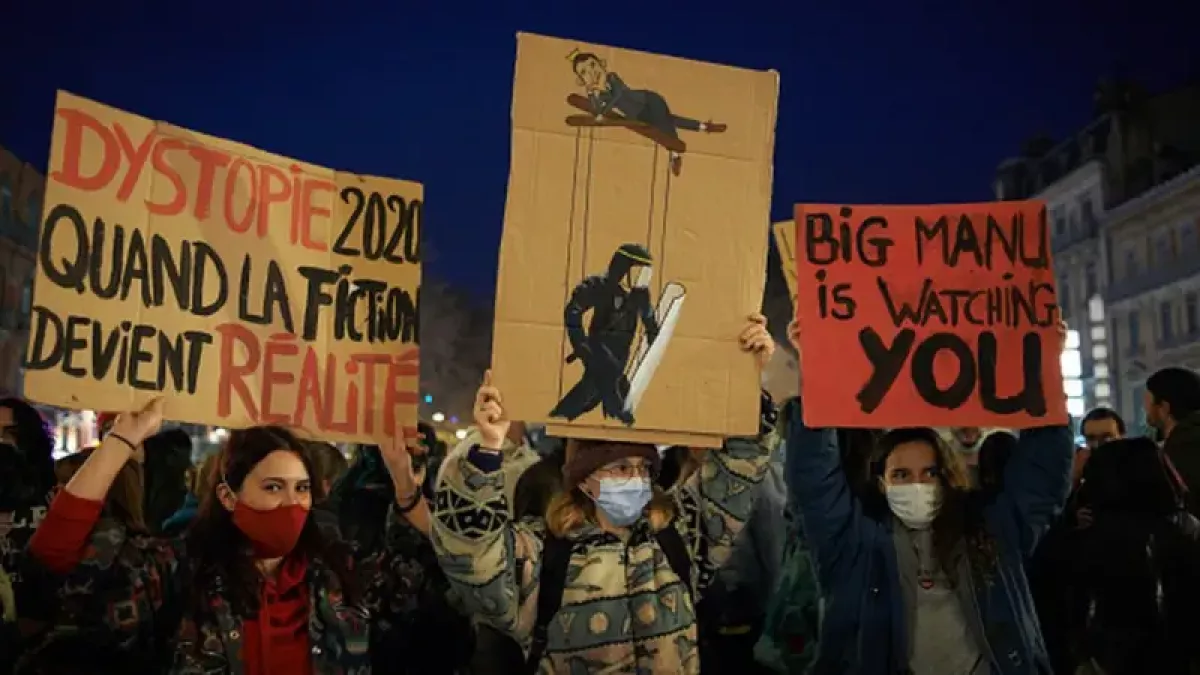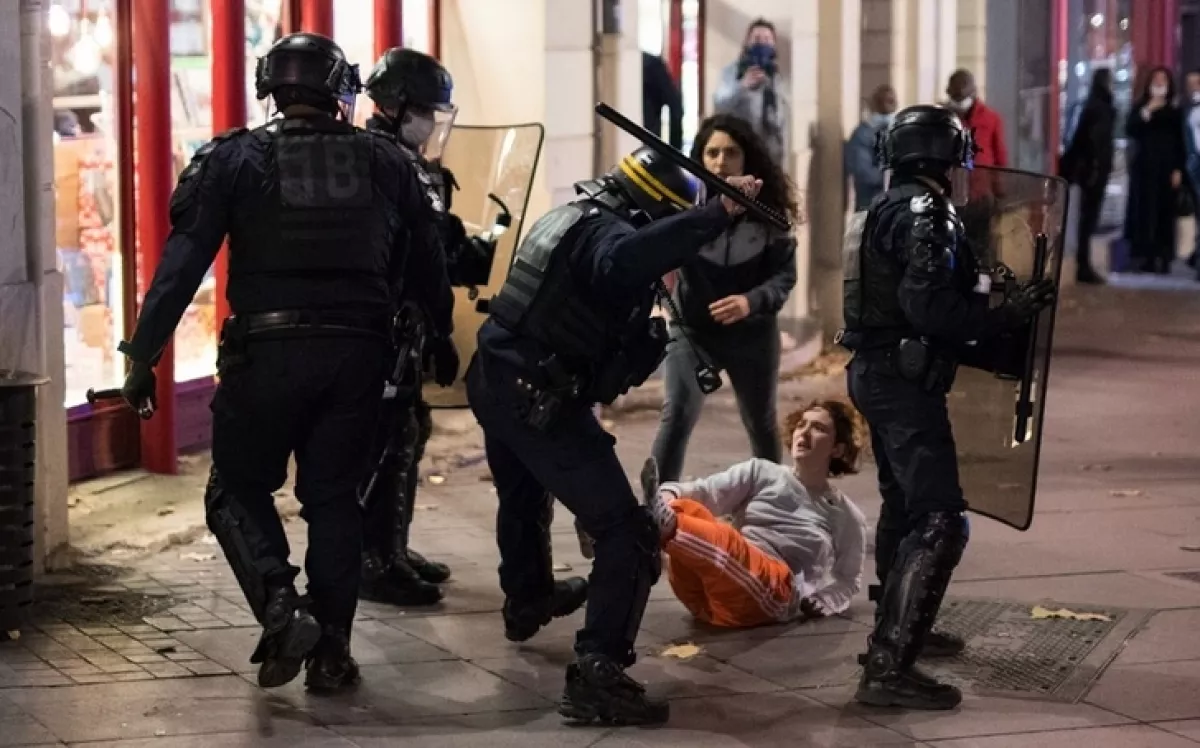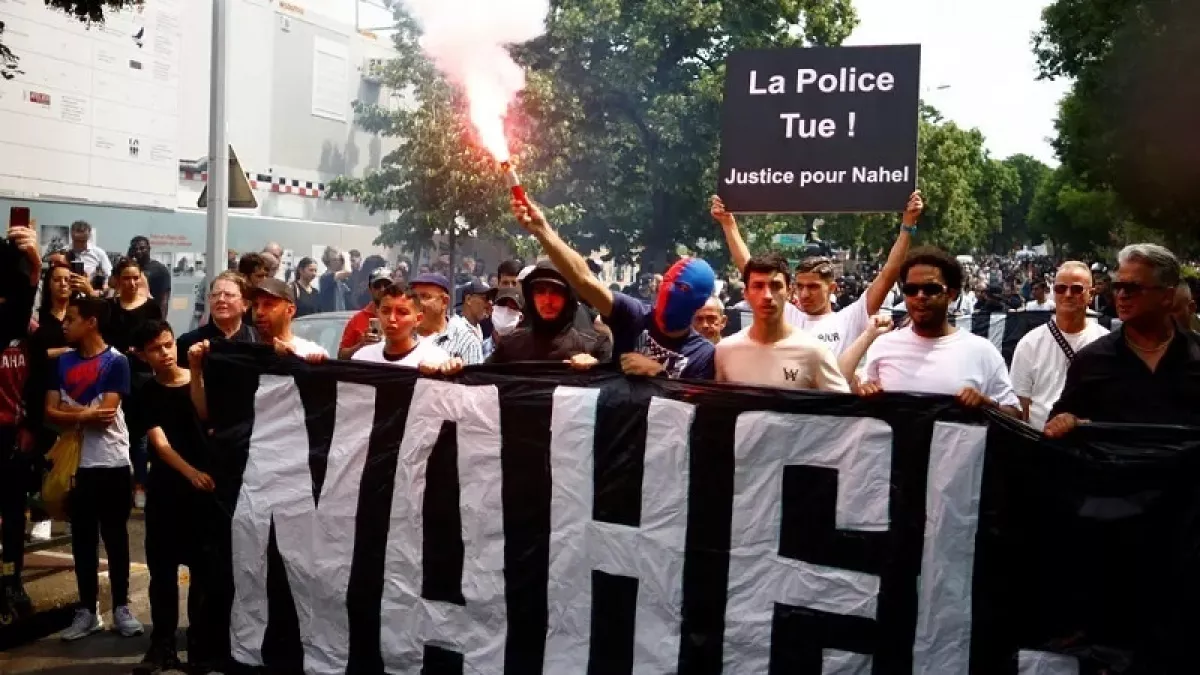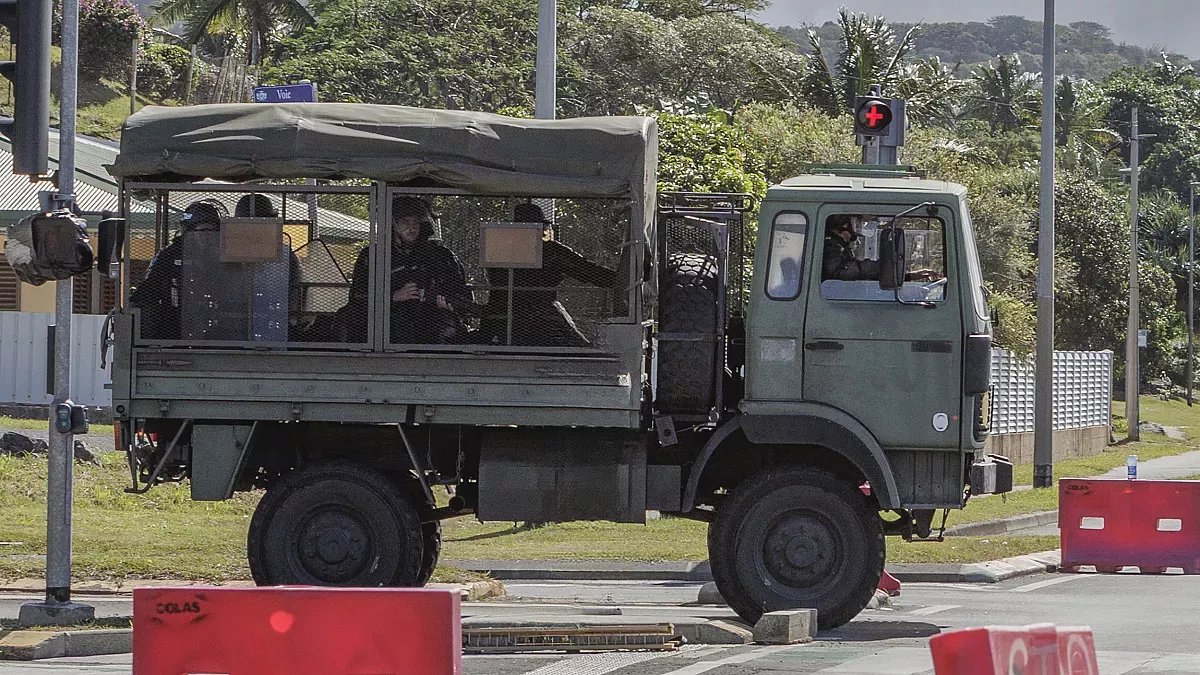Macron's France: Political terror replaces "liberty, equality, fraternity!" Human rights crisis
Political Prisoners in France: Why does the EU ignore its own human rights violations?
In Western nations that boast of their commitment to freedom and democracy, repression against dissenters remains prevalent. This is particularly evident in the context of social protests or anti-colonial movements in overseas territories.
Democracy of immediate imprisonment
“Liberty, equality, fraternity!” — these noble ideals, over two centuries old, have yet to be fully realized in the birthplace of the Great French Revolution. It appears that democracy in France has two distinct faces. On the surface, there are elections, lively debates, and proclaimed civil rights. Yet beneath this facade lies a darker reality: the brutality of police special forces, individuals killed and injured by law enforcement, dissenters arrested and imprisoned, and those who lose their jobs or face ostracism for their views.
In 2016, labour laws in France underwent severe deterioration, sparking widespread protests. During these demonstrations, police used excessive force, resulting in injuries to 800 individuals and the arrest of 753 protestors, who were subsequently prosecuted. In 2014, a meeting of victims of police violence led to the establishment of the "Assembly of the Wounded." However, all of this was merely a "warm-up"...

In November 2018, social protests erupted in France, known as the "Yellow Vests" movement. At the initial demonstrations, the Yellow Vests peacefully rallied, chanting “Police with the people.” However, it didn’t take long for the gendarmerie and the infamous CRS riot police to reveal their true colours. In just the first four weeks of protests, over 3,300 people were arrested, with 2,354 placed in custody. More than 1,200 individuals found themselves facing trial.
During this period, Justice Minister Nicole Belloubet demanded "absolutely harsh" criminal prosecution for the detained Yellow Vests in a Paris court. Such open pressure from the government on the independence of the judiciary sparked protests from the French Lawyers' Union. The Yellow Vests movement began in November, and by December 8, 20 prison sentences—both suspended and actual—had already been handed down.
The basis for these criminal prosecutions could include items such as goggles, masks, or tools found on individuals arrested even before the protests began. This was done under the "Anti-Gang Law," enacted in 2010, which classified such objects as weapons under certain circumstances. Furthermore, during the initial demonstrations, 1,852 people were injured, with some suffering serious injuries.
In the first seven months of the Yellow Vests movement, over 10,000 individuals were detained by the police, and by July 2019, the courts had issued more than 3,100 convictions. Of these, approximately 400 defendants received prison sentences, many with immediate incarceration. According to independent sources, by April 2019, France had 13,000 political prisoners (referring to those arrested during protests), 7,000 injured, and dozens left disabled.
During the dispersal of a demonstration, an elderly woman was killed by a rubber bullet fired directly at her head from an LBD40 grenade launcher. She was not participating in the protest; she was simply closing her window at home. A total of 260 individuals sustained serious head injuries, with 23 losing their eyes, and five had their arms amputated due to police grenades. Injured French citizens formed a collective called “The Maimed,” and the actions of the authorities were rightly labelled as “bloody repression.”

Among the various demands of the Yellow Vests was an end to the neo-colonial exploitation of Africa, the transfer of property from African dictators to the African people, and the withdrawal of French troops from the continent.
Human rights groups, including Reporters Without Borders and the League of Human Rights, condemned the Macron government's brutal suppression of the protests. For appearances' sake, the Council of Europe also criticized the "excessive use of force by state agents."
Tear gas and climate change
French police often justify the use of non-lethal weapons by citing the violent actions of demonstrators, particularly those associated with the "Black Bloc." Interestingly, the organizers of peaceful protests distance themselves from these radicals, labelling them as criminal elements or even police provocateurs. However, even completely pacifist actions are met with violent crackdowns.
In June 2019, activists from the climate organization Extinction Rebellion blocked the Sully Bridge between the 4th and 5th arrondissements of Paris. The protest was entirely peaceful.
"We were dancing, singing, there were families, people preparing food... Then everything happened very quickly; the police arrived, and it was brutal from the start. They quickly deployed gas without any dialogue. We thought we would have time to discuss and negotiate, but no, it was very repressive," recalled protester Ingrid.
Preventive fabrication
French intelligence agencies continuously monitor anyone they deem suspicious, and at times, they openly fabricate charges. A particularly scandalous case is the so-called "Tarnac Affair," which lasted a staggering ten years. In 2005, a group of young individuals settled near the small village of Tarnac, immediately coming under suspicion. Their only "offence" was their presence in the area and the source of funds used to purchase their home.
After eight months of investigation yielded no results, surveillance of these young people—who were active and had international contacts—continued. During this time, the term "anti-terrorist network" entered the lexicon of intelligence agencies, allowing many far-left French and European activists to be swept into a broader net of scrutiny.
In 2008, after several acts of sabotage on high-speed train lines, the Tarnac group was accused of involvement. Approximately 20 people were immediately arrested, yet no substantial evidence was presented against them. The case primarily relied on flimsy "evidence," such as sightings of individuals in a car passing through the area of the sabotage or someone sleeping nearby.
Gradually, the arrested individuals were released, with the last, far-left activist Julien Coupat, being freed in May 2009. Shortly thereafter, the suspects’ lawyers accused French intelligence agencies of forging government documents and engaging in illegal wiretapping, among other allegations. Notably, on the evening of the sabotage, both Julien Coupat and his associate were under surveillance, but the lawyers contend that the surveillance records were essentially fabricated.
However, accusations of terrorism against the Tarnac group continued to be periodically raised and withdrawn over the years. It wasn’t until March 2018 that all defendants were acquitted in court.
“The Tarnac group is a fiction,” stated the judge at the conclusion of the decade-long legal proceedings. The fabricated case unravelled so spectacularly that the official prosecution didn’t even attempt to appeal the acquittal. However, for the activists, the ordeal did not end there. In December 2018, during the Yellow Vests protests, Julien Coupat was preemptively detained by the police for "participating in a group formed with the intent to cause damage or violence."
Prisoners of the social ghetto
In 2022, France was once again rocked by social protests triggered by a sharp rise in the cost of living. In 2023, over a million French citizens participated in demonstrations and strikes against a two-year increase in the retirement age. Yet the Macron government not only ignored the streets but also disregarded the opinions of several lawmakers, utilizing a constitutional article that allowed it to implement pension reform without a vote. Once again, police resorted to force to suppress the protests.
French prisons are currently overcrowded. Last year, they operated at an average capacity of 120%, while detention centres were at 146%. Nearly 2,500 inmates had to sleep on mattresses on the floor due to a lack of space. The rapidly declining standard of living in France has led to a rise in petty crime. Last year, hundreds of young people protesting against yet another act of police violence found themselves behind bars.
In a suburb of Paris, police shot and killed 17-year-old Nahel Merzouk.

This is far from the first such incident in France, a country notorious for the brutality of its police. In June 2023, enraged youth took to the streets, sparking riots across the nation. To suppress these spontaneous protests, Macron mobilized an additional 45,000 police officers and deployed armoured vehicles. Over 3,600 individuals were arrested, with 742 sentenced to various prison terms, including several long-term incarcerations. Notably, the average age of the protesters was just 17, the same age as the slain Nahel.
Flight to Europe -in chains
Authorities treat arrested activists advocating for the independence of their peoples from French rule with particular brutality.
Since the onset of anti-colonial protests in New Caledonia, the police have arrested over 1,500 individuals. In June 2024, a group of political prisoners, including Christian Tein ("Bishu"), considered the leader of the Coordination Cell for Field Actions (CCAT), were transported to France on a specially chartered flight. The conditions of their detention were inhumane and degrading. Before boarding, they were kept shackled to a wall with their hands raised. Throughout the entire 30-hour flight, the detainees were in handcuffs and strapped to their seats, and they were prohibited from speaking. They were escorted to the restroom without having their handcuffs removed, with the door to the bathroom left wide open at all times.
The two women in this group of political prisoners faced particular stress. Transported 17,000 kilometres from their home, Christian Tein, Guillaume Vama, Steeve Une, Erwan Waetheane, and Dimitri Quenegei were placed in different prisons across France. Christian Tein is held in solitary confinement at the Mulhouse-Lutterbach penitentiary centre. The seven activists currently face charges of "complicity in attempted murder," "armed robbery by an organized gang," "destruction of another's property by an organized gang in ways dangerous to people," and "participation in a criminal organization with the intent to prepare a crime." While the men remain incarcerated, the women have been released under police supervision.

The French authorities also deny political prisoner status to activists advocating for the independence of Corsica. One of the most notable Corsican prisoners, Yvan Colonna, was beaten to death under strange circumstances by his cellmate, an Islamic fundamentalist.
Recently, French police arrested pan-African activists Kemi Seba and Hery Djehuty. Their associates stated that they had "joined the ranks of political prisoners in a racist and brutal state that continues to abuse and violate the law and rights." Kemi Seba is a well-known public figure from Benin advocating for the complete decolonization of Africa. Due to his fierce anti-Western stance, he was stripped of his French citizenship in July of this year. During the revocation process, Seba publicly burned his French passport. He has also conducted several high-profile protests against the French colonial franc (KFA), which he considers a tool for the exploitation of African nations.
On October 15 of this year, Kemi Seba arrived in France on a Schengen visa, intending to visit a sick relative and address members of African diaspora communities to rally support for states striving for full sovereignty in Africa. He was immediately arrested by agents of the General Directorate for Internal Security (DGSI) on suspicion of "working for a foreign state," which could have led to criminal prosecution. It was only after a series of protests that his release was secured.
Perhaps the most unprecedented and harsh police measures in the history of the Fifth Republic, coupled with the tumultuous protests both in mainland France and its overseas territories, as well as the rising number of inmates in French prisons, indicate one thing: the French government is entering a period of profound crisis. To emerge from this crisis, it must fundamentally change its approach not only towards its own population but also towards the peoples of other nations that are resolutely pursuing their paths to sovereignty and independence.








